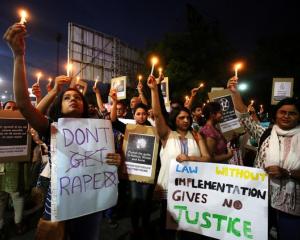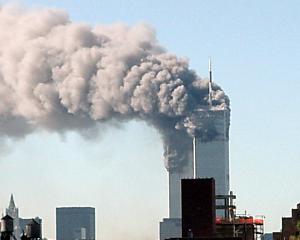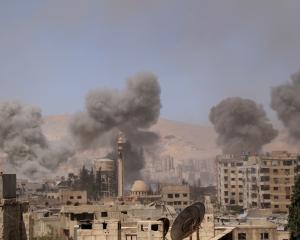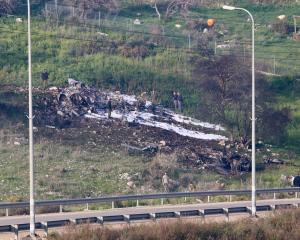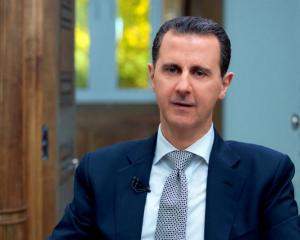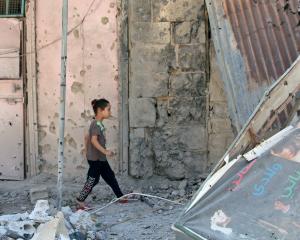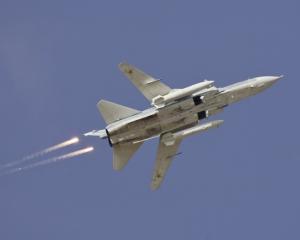Syrian forces backed by tanks have killed at least 14 civilians in the city of Homs in one of the fiercest military assaults on urban centres to crush six months of pro-democracy protests, activists and residents said.
Residents said the assault concentrated on old districts that have been seeing daily street demonstrations demanding the removal of President Bashar al-Assad.
It came as the Arab League announced that its secretary general will visit Syria on Saturday and Arab foreign ministers will meet next week to convey concerns over the crackdown.
"Military helicopters are flying overhead and snipers are shooting from rooftops at anything. Tank machinegun fire is coming at us like rain," a resident of the Bab Sbaaa district who did not want to be further identified told Reuters by satellite phone.
Human rights campaigners say Syria's ruling hierarchy has stepped up efforts to crush demonstrations in recent weeks, including more frequent military raids, targeted assassination of protest leaders and the arrest of thousands of Syrians.
Assad, 45, has repeatedly said he is facing a foreign conspiracy to divide Syria. The authorities blame armed militant groups for the bloodshed, and say 500 police and soldiers have been killed, with the military deployed to protect the public from terrorists.
Homs, hometown of Assad's wife Asma, is situated on the main northern highway 165km from Damascus. Old districts such as Bab Sbaa, Bab Dreib and Bab Hut have seen the biggest daily protests to demand that Assad step down. Their mazes of streets help protesters escape from security forces, activists and residents said.
Residents of the nearby town of Rastan posted a YouTube video apparently showing 12 defecting soldiers in military fatigues appearing from a balcony of a commercial building to ecstatic cheers and applause of protesters.
"We will be one hand to bring down Bashar and every traitor," said one soldier from a microphone in the video.
Arab League Secretary-General Nabil Elaraby had originally been expected to travel to Damascus on Wednesday. Arab diplomats said the visit was delayed at Syria's request.
An Arab diplomatic source said Syrian authorities delayed the visit after Elaraby met Syrian opposition members and because of a leaked Qatari proposal for possible demands that Arab states would make to Assad. The Qatari proposal had not yet been adopted, the source said.
Louay Hussein, a prominent opposition figure, told Reuters that the Arab League initiative had not stopped the attack on Homs from being "more random and severely repressive than what we had seen before", leading to more calls for armed resistance.
He pointed to another YouTube video purportedly filmed in Homs this week, which showed several soldiers in uniform next to light tank shooting a man lying on the street several times over. One soldier congratulates another for continuing to fire at the body, saying: "You are truly a beast".
A local group, the Homs City Neighborhoods Union, said most telephone lines and Internet connections with Homs had been cut.
Assad, who inherited power from his father in 2000, has promised change, including a multi-party parliamentary election by February, but independent lawyers said a new political parties law kept an old majority quota system for farmers and workers whose representation is controlled by the state.
Tanks and troops moved into Homs four months ago and occupied the main square in the city to try to end protests demanding the removal of Assad, who is from the minority Alawite sect in the mainly Sunni Muslim country.
Alawites dominate senior ranks of Syria's security forces and core army units that have besieged towns and cities.
Most of the casualties reported in Homs since the army deployed there have been caused by assaults on Sunni areas, but activists have also reported the deaths of several Alawite residents in apparent revenge killings.
Activists and residents have also reported an increasing number of defections among the mostly Sunni rank and file military in Homs and its surrounding countryside.
Syrian authorities, which have barred most independent media from the country since the uprising began in March, say there have been no desertions from the military.
The International Committee of the Red Cross (ICRC) said on Tuesday it was seeking access to thousands of demonstrators believed to be in informal detention centers. A day earlier, the ICRC announced Syria had opened a prison for the first time.
Human rights campaigners say Syrian forces have arrested tens of thousands of people during the uprising, with many being housed in security police buildings off-limits to the ICRC.
The European Union, which imposed a ban on purchases of Syrian oil on Sept. 3, was working on a new round of sanctions, the French foreign ministry said on Tuesday, to target entities that enable the "daily repression" of civilians.
Syria's finance minister said in Abu Dhabi on Wednesday that Syria can sidestep European and U.S. import bans by selling its oil to Russia or China, but economic growth and overall exports have suffered.



